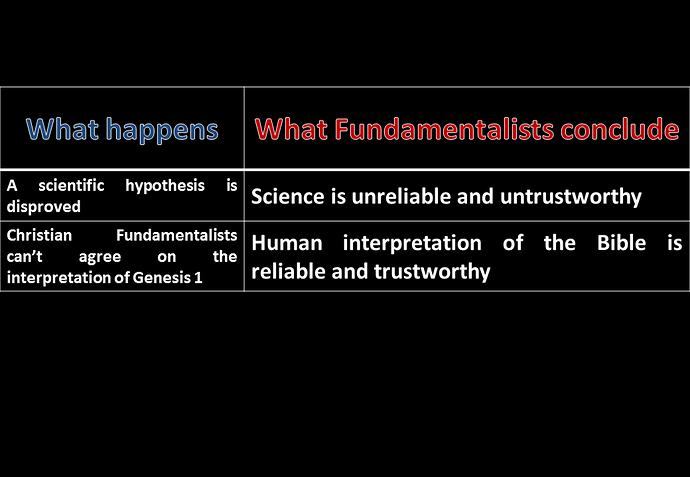No. But given the Reformation had already happened, and there was already plenty of fallout from that, I doubt that the Church was more concerned with that than the idea that heliocentrism contradicted what they thought Scripture said.
Yes I did. I said what makes an interpretation inspired is that it is given by an individual who is inspired. This is pretty simple stuff. The question of how we interpret those authors correctly is a separate issue.
Great, so you agree with me.
I am not saying anything new, I am saying what I have always said. As I have pointed out, there was nothing stopping the medieval Church from coming to a harmonization of heliocentrism and Scripture. It had already been done before Galileo, and Galileo himself was one of several people who proposed such a harmonization. The exegetical incompetence on the part of the Church (especially Bellarmine), is actually surprising. They didn’t need to “read the right book” or “take the right course”. Even if they had just taken the advice of Augustine over 1,000 years earlier, they could have saved themselves the embarrassment and shame of idiotic blundering and a couple of centuries of attempting to deny what many other people already knew.
That’s like saying not everyone agrees that the earth is round. Where we go for the final authority is evidence based science. Not me. Definitely not you. The scientific consensus is a far more reliable guide. Evolution has not been a matter of serious scientific debate for decades. It was settled a long time ago. It is not “a theory in crisis”, and it has proved to have enormous explanatory and predictive power.
This isn’t in dispute, and doesn’t affect the argument I have been making. What is extraordinary is that the Church didn’t make the scientific arguments against Galileo that would have strengthened its case significantly. Instead it just waved the Bible and said “You’re wrong, it says so here”, just like Ken Ham.
That it wasn’t a novelty is relevant, because it proves the Church didn’t have to set science against Scripture in the way that it did. There was already a lengthy Christian tradition of harmonizing science and Scripture, using the very same argument that Galileo used. But the Church did not make use of that tradition, and Bellarmine explicitly rejected that argument. As I said, the Church should have known this. Many people knew this. It wasn’t a novelty. Galileo knew it. Augustine warned about it. The Church just plain blundered. You haven’t addressed this yet.
Yes, especially on matters where the Bible is silent.
No. That’s nonsense. Firstly science had not established that the universe was infinite. On the contrary, 100 years ago science was just discovering evidence that the universe was not infinite, and this was a shock because scientists realized they had previously simply assumed this without any evidence; it was one of the last holdovers of Aristotelian cosmology. Ironically this idea had already been dismantled comprehensively by John Philoponus in the sixth century, using both science and Scripture.
In other words, when scientists actually did science, they came to a reliable conclusion.
You’re conflating established science with philosophical claims.
That’s why it isn’t established science.
Yes. Not the idiotic gibbering of people like Ken Ham, or the spittle flecked raving of people like Robert Sungenis.
Are you saying that they knew the correct method of harmonizing science and Scripture in this case, but deliberately chose not to exercise it because they wanted to enforce an interpretation of the Bible and uphold their authority? Where is the evidence that their claim Galileo was wrong, was “based on what was then the best established science”?
Well yes. I argue on the basis of the available evidence.
No. This is a false analogy. It is false firstly because I have never said there were no other reasons for their persecution of Galileo. On the contrary I have said several times that political intrigue and personal malice were factors contributing to Galileo’s persecution. But those were not contributing factors to the Church’s objection to heliocenrism. It is also false because there is no reason to doubt that the Church held theological objections to heliocentrism. It had held to a geocentric interpretation of Scripture and the cosmos for over 1,000 years previously, and had objected explicitly to heliocentrism when it was raised earlier. So to claim that when Bellarmine objected to heliocentrism “he didn’t really mean it”, or that when the Church placed all heliocentric books on the Index “it didn’t really object to heliocentrism, this was just a ruse” is irrational.
There is no data which contradicts the conclusion that the Church held to a geocentric interpretation of Scripture and the cosmos, and there is no data which contradicts the conclusion that the Church viewed heliocentrism as heresy.
No. I have already answered this many times. It mattered to them because in their view Galileo was contradicting the word of God, which was to them was heresy and damaging to the faith.
Of course nobody holds to an interpretation they believe to be false. But you’re not addressing what I wrote. The point I made was that they did not separate their interpretation of what Scripture says, from what Scripture says. Not everybody does this. Careful exegetes avoid this blunder. People like Augustine had previously warned about this blunder. He had even warned about it specifically on the subject of science.
I did not say their reasons were “just about who gets to determine opinion”. Ironically you’ve come the closest to saying that.
[quote=“fmiddel, post:258, topic:4380”]
Were they wrong? Absolutely. Did they believe they were doing the right thing? Absolutely. Any one of us can fall into that trap. Nobody is immune.[/quote]
Exactly. So to return to the original point, when Christians object to evolution they need to prove they are not making the same silly mistake as the Catholic Church did over heliocentrism.

